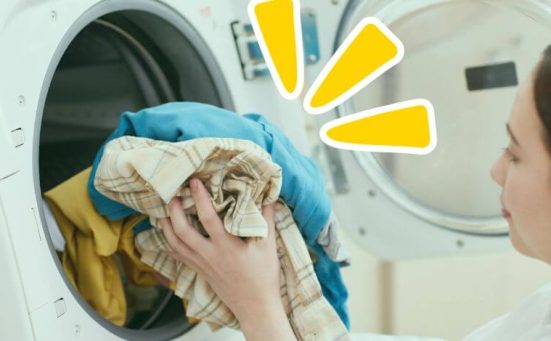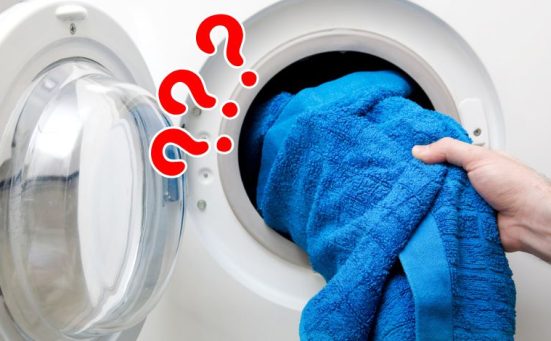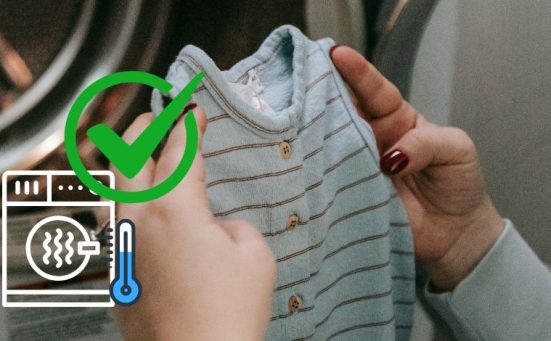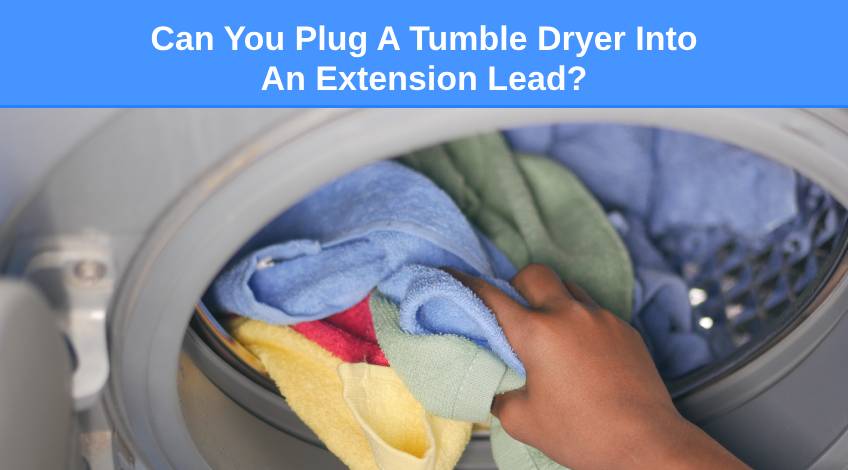
Can You Plug A Tumble Dryer Into An Extension Lead?
If you’ve just bought your first tumble dryer and you’ve discovered that the lead doesn’t reach your wall socket, you’re probably wondering what to do. You might have considered using an extension lead, but is that safe?
The short answer is, it is safe to use an extension lead but only under the right conditions. You need to be aware of the potential safety risks involved with using an extension cable with an appliance that demands a high rate of power.
If this is the situation you find yourself in, keep reading. In this article we look at why using a tumble dryer through an extension lead can be dangerous and also the safest way to supply power to your appliance.
Is It OK To Plug A Tumble Dryer Into An Extension Cable?
It is OK, under certain conditions, to plug a tumble dryer into an extension lead. But there are 3 things that need to be considered which are;
- The Wattage Of The Dryer
- The Maximum Load Capacity Of The Extension Cable
- If There Are Any Other Appliances Connected To The Same Extension Lead
Essentially, as long as the dryer doesn’t draw more power than the load capacity of the extension lead and there’s nothing else drawing power at the same time on the same extension lead, all should be well.
However, you should always ensure that the extension lead is fully uncoiled. This is because the rating of the cable alters when it is coiled to when it’s fully extended. In a coiled state, the extension cable cannot take as much power as it can when it’s fully uncoiled.
The Wattage Of The Dryer
Back in the early days of tumble dryers they used to have a wattage of 3,500 W or 3.5 kW, To run this through an extension cable would require a lead that was rated 13 Amps because this would mean it was capable of conducting 3120 W. However, even this had its limitations (more below).
The Maximum Load Capacity Of The Extension Cable
Assuming the extension cable is rated at 13 Amps, it should be capable of carrying 3120 W which should be ample for the average tumble dryer. Nowadays the wattage of dryers varies between 800 W to 2,500 W so a decent 13 Amp rated extension cable should be fine.
There can be problems though, the cable needs to be straight, uncoiled especially if your dryer has a wattage of 2 kW or more. This is because as we said above, when the cable is coiled it has a lower rated capacity (it’s all due to resistance).
The cable shouldn’t be over long either, ideally a 1 metre cable should be your limit any longer and the cable is liable to overheat.
Overloading The Extension Cable
Overloading of the extension lead can occur if you have two or more appliances running through it at the same time. Especially if one of them happens to be drawing 2 kW of power.
You really need to be aware of the amperage of the appliances you’re planning to run through the extension lead. The first thing to check is that the cable is as thick, or thicker than the cable fitted to the tumble dryer by the manufacturer.
If it is as thick you can assume that it’s a 13 Amp cable and has 3-core wire inside. However, you should be careful when making assumptions because if you were to plug your dryer into an extension lead which was only rated 10 Amps, it could overheat and catch fire.
Also many of the 10 Amp leads aren’t earthed either. If the dryer develops an insulation fault and the cable isn’t earthed, it could kill someone.
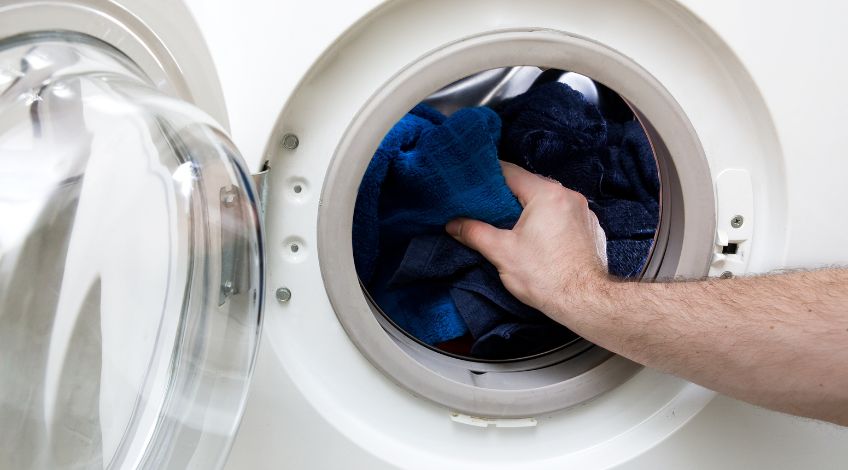
The Potential Dangers Of Plugging A Tumble Dryer Into An Extension Cable
We’ve just got through saying that using a 13 Amp extension cable which is earthed should be perfectly safe to run a tumble dryer through. However, it would be remiss of us not to point out the potential dangers.
You see, the reality is, it is never completely safe to use an extension cable with a heavy duty electrical appliance like a washing machine or tumble dryer.
In fact tumble dryer manufacturers all agree that it’s not safe. Added to which, they also point out that using their appliance when connected to an extension lead invalidates any warranty.
This is because any extension cable has the potential to overheat and cause a fire or damage in some way to your appliance or your home. Which begs the question, why do tumble dryer manufacturers fit such short cables to their appliances?
Noticed Weird Smells Coming From The Dryer?
If you start to smell a weird fishy smell coming from the area where the tumble dryer is sited, you should cut the power immediately. That fishy smell could be caused by burning plastic on the plug, extension cable or wire.
This is often caused by a bad connection that causes a spark and burns the plastic.
Are Extension Leads Safe?
As all tumble dryer manufacturers agree that it’s not safe to use an extension cable with their appliances, we need to look at the safety of extension leads.
The reality is that if an extension lead wasn’t considered to be safe, trading standards here in the UK wouldn’t allow them to be sold. So why do tumble dryer manufacturers consider them to be unsafe?
The reason for this is that manufacturers can only guarantee their own products. They have no control over the type of extension cord you use.
Many extension leads are cheaply made and not really fit for running high demand appliances like tumble dryers. Some are too thin, others are too long while others still have lower value fuses (3 Amp). All of which is beyond the control of the appliance manufacturer.
Using A Tumble Dryer With An Extension Lead Safely
If you do decide to use an extension lead with your tumble dryer, there are a few things you can do to lower the risk of any problems. Which include;
Use A Heavy Duty Extension Lead
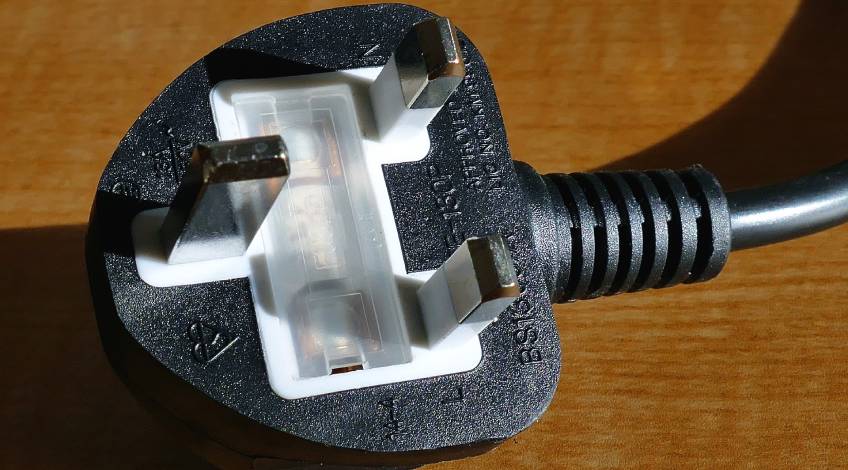
The extension cable you use should be as thick or thicker than the cable fitted to your tumble dryer. A thicker lead can usually carry more power which should mean there’s less chance of it overheating.
It should also be a 3 core lead (with an earth) and have a rating of 13 Amps.
Keep It Short
There are some extension cables that can extend up to 50 metres in length. But the longer the cable, the less likely it is to be able to handle a heavy electrical load and the more likely it is to overheat. This is because the further the electrical current has to travel, the harder it has to work to get there and it’s this overworking that leads to overheating.
For general safety, it is recommended that an extension cable should be no longer than 15 metres. But when it comes to large electrical appliances like tumble dryers, the shorter the extension lead is, the safer it is.
Ideally the cable should be just long enough to reach the dryer and wall socket. Whilst being short enough to prevent overheating.
Only Use A Single Socket Extension
You can buy 6 and even 8 socket extension leads but the more electrical appliances drawing power at the same time, the more likely the cable is to overheat.
Tumble dryers demand a pretty high power rate which means anything else using the extension cable would be draining on that power. This can lead to too much power demand and an insufficient supply.
We recommend a single socket extension cable for use with a tumble dryer as there’s less chance of demanding too much power at any given time.
Use A RCD Too
It’s also a wise choice to plug the extension into a RCD (Residual Current Device) which could potentially save your life. The RCD protects against electric shocks, electrical fires, and offers far more protection than a fuse or circuit breaker.
It works by shutting off the power automatically if there is a fault. The RCD is constantly checking the flow rate of electrical current running through the circuit it is plugged into.
Get Another Wall Socket Installed
If, after reading all of the information above, you’re having doubts about using an extension cable, we would suggest getting another wall socket installed specifically for the tumble dryer. You can get it positioned within easy reach of the appliance and it won’t cost you the earth either.
In fact, depending on the area you live in and whether you want a single or double socket, the cost could be anywhere between £70 to £200.
If you’re thinking that £200 is a bit excessive, we would ask you, what price do you put on safety?
How Much Power Do Tumble Dryers Actually Use?
Heavy duty electrical appliances like tumble dryers need a large amount of power to make them work. The power needed for the average dryer is somewhere between 1,800 to 3,500 watts (1.8 to 3.5 kW).
There are some heat pump dryers that only require around 800 W so you’ll need to consult your user manual for exact figures.
Due to the high power rate needed by the average dryer, extension leads need to be able to safely carry enough electricity to power the appliance. Which is why you will need an extension lead capable of carrying a maximum load of 3,500 watts.
The extension cable should have its maximum wattage printed on it somewhere. However, as a general rule of thumb, cheaper extension leads tend to have a lower load capacity.
If you’re looking for a decent, safe extension cable, we would suggest this one by Masterplug.
- HEAVY DUTY, FOUR -SOCKET, 13A EXTENSION LEAD IN ORANGE: Designed for rugged work environments, providing consistent power in challenging settings. Suitable for DIY and light industrial use
- REWIREABLE DESIGN FOR A CUSTOM POWER SOLUTION: It’s designed to handle tough conditions with ease. Maximum load 3120W 240V. Suitable for power tools, portable lights and electrical appliances
It has a 13 Amp, 240 Volt rating and a thick cable which is 5 metres in length. This extension cable is fully guaranteed and will give you years of safe usage.
Can You Use An Extension Lead With A Tumble Dryer?
Tumble dryers are large electrical appliances and as such, use a lot of electricity. This means ideally they should be connected directly to the mains wall socket. However, if this is not possible because the socket is too far away, you can use an extension cable as long as you follow the guidelines above.
It’s worth remembering that tumble dryer manufacturers will void any warranty if you are using an extension cable to power their appliance. However, many people are using decent, safe, reliable extensions like the Masterplug above without any problems.
As long as you’re sure of the wattage of your appliance and the maximum load of the extension lead, you should be OK. But, if you’re in any doubt at all, we recommend getting a new wall socket installed.
SEE ALSO: Does Putting An Ice Cube In The Tumble Dryer Take Out Wrinkles?
Frequently Asked Questions
Here in the UK it is perfectly safe to plug a tumble dryer into a normal wall socket. However, you should never overload the socket by using an extension lead or multiplug when using a tumble dryer or any other high power appliance.
It is not recommended that you plug a dryer into an extension cord unless you are sure of the power demand of the dryer and the maximum load capacity of the extension lead.
It is recommended that heavy duty appliances like washing machines, tumble dryers, refrigerators, A/C units and chest freezers should be plugged directly into the wall socket and not into an extension lead.
Also, follow us on Pinterest ...


